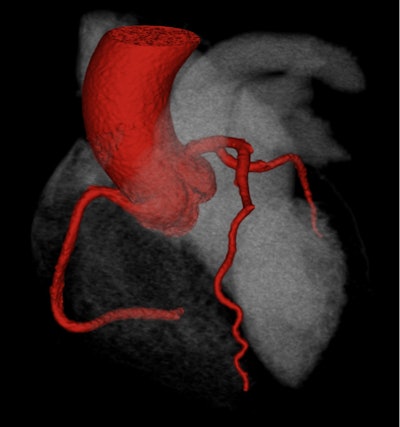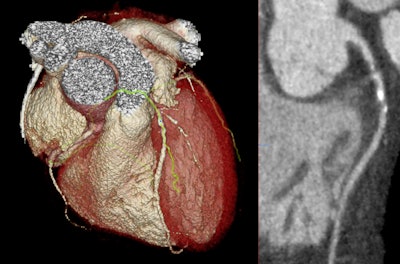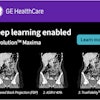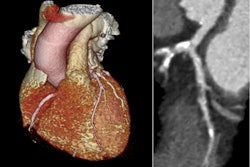CT assessment of coronary artery disease can have a major impact on the management of patients with stable chest pain, according to a new 10-year analysis from the SCOT-HEART trial presented on Sunday 1 September at the annual congress of the European Society of Cardiology (ESC) in London.
In a special ESC breaking news session, Prof. Michelle Williams, professor of cardiovascular imaging at the University of Edinburgh, U.K., revealed how the latest results show that coronary CT angiography (CCTA) management is associated with a sustained 10-year reduction in coronary heart disease death and nonfatal myocardial infarction and that these long-term benefits are predominantly driven by the prevention of nonfatal myocardial infarction. In addition, this comes at no extra burden on healthcare budgets related to revascularization costs.
"SCOT HEART changes diagnosis and management of patients with stable chest pain, and preventative management is probably driving the reduction in heart attack. People are still more likely to be taking their preventative medication if they've had CT-guided management," she told AuntMinnieEurope.com ahead of the meeting.
 Prof. Michelle Williams from Edinburgh.
Prof. Michelle Williams from Edinburgh.
In this multicenter, parallel group trial, patients with stable chest pain were randomized (1:1) to standard care or standard care plus CCTA. In total, 4,146 patients between the ages of 18 and 75 (1,821, 44% female) were recruited: 2073 in the standard care group and 2073 in the CCTA group, both groups having similar characteristics, including the prevalence of chest pain symptoms by type. The researchers obtained clinical outcomes through record linkage from national registries and the primary outcome was coronary heart disease death or nonfatal myocardial infarction.
After 10 years of follow-up, the research team found that coronary heart disease death or nonfatal myocardial infarction was lower in the CCTA group compared with the standard care group (n = 137, 6.6% vs. n = 171, 8.2%) and this was primarily driven by a reduction in myocardial infarction (n = 90, 4.3% vs. n = 124, 6%).
The team found no difference in all-cause mortality (n = 168, 8.1% vs. n = 166, 8%) or coronary revascularization between groups (n = 313, 15.1% vs. n = 317, 15.3%).
 A 3D reconstruction of a CT coronary angiogram from a patient in the SCOT-HEART trial who had normal coronary arteries. All images courtesy of Prof. Michelle Williams and SCOT-HEART.
A 3D reconstruction of a CT coronary angiogram from a patient in the SCOT-HEART trial who had normal coronary arteries. All images courtesy of Prof. Michelle Williams and SCOT-HEART.
Williams, who is also associate director of the British Heart Foundation Data Science Centre, noted that with even longer-term analysis, cardiovascular or all-cause mortality might also show some differences between the CCTA group and the standard care group, but the average age of trial participants (67 years) currently may still be too young to reveal that difference. Interestingly, there has been no change in the use of revascularization with CT management, despite a worry that the improvement in diagnosing coronary artery disease with CT would lead to more invasive coronary angiography.
"We have shown categorically at ten years that this is not the case. The use of invasive coronary angiography is the same between the patients in the standard care and the CT arm. The difference is that those patients with normal coronary arteries aren't going to the cath lab so we are doing the same number of invasive coronary angiograms, just in people who really need it," she said.
Williams also flagged how invasive coronary angiography, stents, and grafts were very useful for improving patient symptoms but not for preventing heart attacks in the long term. "For the vast majority of patients, the long-term benefit of CT-guided care is because of the increased use of preventative medication and not revascularization," she noted.
Furthermore, the trial has demonstrated that people who have had their management guided by CT scans were more likely to be given preventative medication because of the imaging and more likely to still be taking it at 10 years.
 A 3D reconstruction and curved planar reformation from a CT coronary angiogram from a patient in the SCOT-HEART trial who had severe obstructive coronary artery disease.
A 3D reconstruction and curved planar reformation from a CT coronary angiogram from a patient in the SCOT-HEART trial who had severe obstructive coronary artery disease.
In addition, she noted that females in the CCTA group showed a lower risk of myocardial infarction than males. "Is it that women are undertreated by our current way of assessing risk and CT identifies disease that they didn't know that they had? It might also be because once someone knows they have coronary artery disease they are more likely to take their tablets or other treatment, and people may react differently depending on whether they are men or women," Williams said.
This and other topics will be examined more thoroughly in SCOT-HEART 2, recruitment for which began in 2020. This trial aims to explore how to identify and treat coronary artery disease in at-risk asymptomatic individuals, with patients divided between standard care and CCTA-managed care. In addition, the trial seeks to show whether the information from CT impacts lifestyle decisions such as diet, smoking, and activity levels.
The first trial results were presented by Dr. Michael McDermott in the same ESC session. In a subgroup of 400 patients, CT helped this patient group to live more healthily in the short term, not just by taking medication regularly but also by walking more and eating better. Volunteers who live in Scotland and meet the trial criteria can still apply.
10-year impact
SCOT-HEART's five-year results have already had a major impact on the UK's National Institute for Health and Care Excellence (NICE) guidelines, and CCTA guidance was adopted as the first-line test in 2016. It has also been incorporated in other European and U.S. guidance.
"The 10-year results confirm and present a really compelling case that this is a good thing to do for patients and hopefully this will help people who are still struggling to implement those guidelines in regions and countries around the world," Williams noted.
The full title of Sunday's presentation was: Coronary CT angiography guided management of patients with stable chest pain: 10-year outcomes from the SCOT-HEART trial. Michelle C Williams, Ryan Wereski, Philip Adamson, Anoop Shah, Edwin JR van Beek, Giles Roditi, Colin Berry, Nicholas Boon, Marcus Flather, Steff Lewis, John Norrie, Adam D Timmis, Nicholas L Mills, Marc R Dweck, David E Newby.




















